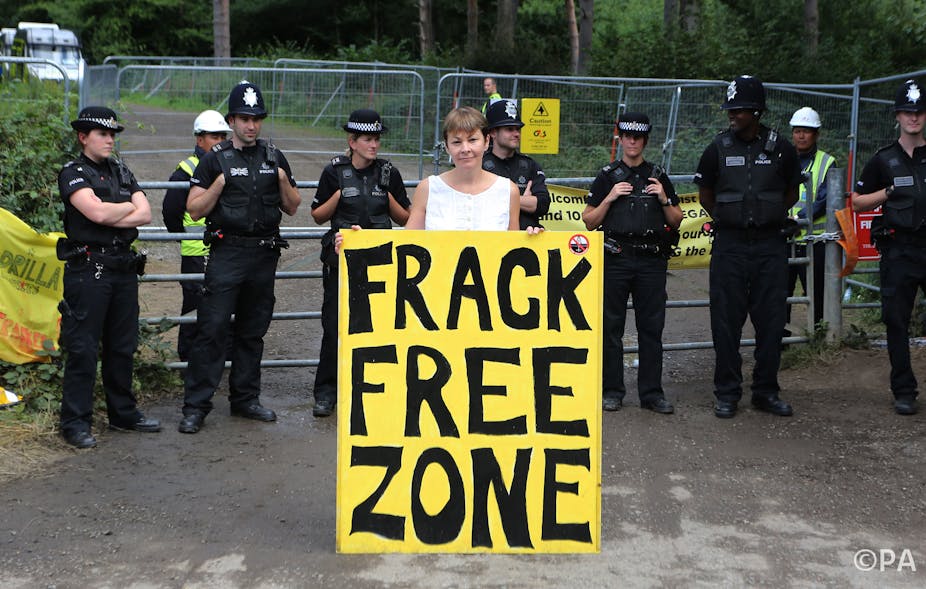Caroline Lucas, Green MP for Brighton Pavilion, is in court for breaching a police order on public assemblies and wilful obstruction of a highway – she was taking part in an anti-fracking demonstration. Her trial highlights many aspects of the fracking debate. But while her protest was focused on environmental concerns, there is a human rights element to the debate that must be recognised too.
It’s clear that fracking is a divisive issue in the UK. While the government is taking a clear pro-fracking stance, in communities around the UK there are both supporters and opponents fighting over whether or not we should develop our “unconventional” shale gas reserves.
Energetic debate
On the one hand, supporters argue that it will reduce gas prices, create jobs, provide domestic “energy security”, all the while lowering carbon emissions.
Its opponents, however, question all of these claims in the face of growing evidence to the contrary. They point to its many negative impacts, including the potential contamination of water and soil from toxic chemicals used in the process of fracturing the rock. This toxic contamination could give rise to serious health problems. Plus, the 40,000bhp diesel pumps that drive the injection process pollute the air and have potential health impacts including reports of increased cancer rates in communities close to existing shale wells in the US.
Water supplies could also be affected by fracking activities, with the prospect of water shortages due to the considerable volume of water used, and lost, in the process (19m litres). There are significant concerns over subsidence and local earthquakes, such as the tremor produced by Cuadrilla in Blackpool in April 2011, which seriously damaged the well casing. This further threatens water supplies with contamination.
Other environmental concerns include fracking’s potential contribution to climate change. Extracting oil and gas by fracking is perpetuating our continued reliance on fossil fuels, at the expense of investing in renewables.
Communities faced with the prospect of fracking have raised a number of concerns, such as fears over falling house prices, the fear of the industrialisation of the countryside, and who would cover the cost of clean-ups when things go wrong.
Social power
While many of these issues have been raised by journalists, activists, and documentary film-makers, to date there has been little in-depth research into the cumulative impact of fracking on the quality of life of local communities who have first-hand experience of the developments. And so, it seems that fracking is fast becoming a human rights issue.
As de Rijke notes: “The extraordinary expansion of the unconventional gas industry has … led to questions about social power and the rights of individuals and local communities.” Meanwhile, the “close relationship between governments and powerful multinational corporations brings to the fore questions about political influence and human rights.”
The current processes certainly appear to be sidelining the right to live in a healthy and safe environment, where the rights to health and water (including access to safe drinking water) are guaranteed. If this is the case, then the environmental human rights of people in affected communities are at risk.
Right to protest
Civil and political rights are also threatened – most obviously exemplified by Caroline Lucas’s arrest for peacefully protesting against fracking. Despite obvious government support for fracking, large sections of the population are clearly opposed to such techniques. We must consider how their rights to make their opposition known are affected.
The right to security, the right to information, freedom of assembly and peaceful protest must be ensured, especially to human rights defenders, including local environmental protesters. Local populations should be fully informed of the potential environmental impacts of fracking, as well as both its advantages and disadvantages, through a comprehensive environmental and social impact assessment.
There are also economic, social and cultural rights to bear in mind. These include the right to an adequate standard of living, the right to health, right to water and the right to food, which are endangered by the potential for contamination of soils and water systems.
Future generations
Finally, it is essential to consider the broader responsibilities that we have towards the environment. Sustainability is strongly linked with human rights, particularly because of the impact that climate change has for us and for future generations. We have an imperative moral responsibility, in addition to a legal duty under the 1992 UN Framework Convention on Climate Change, to favour the development of renewable energy sources over the exploitation of fossil fuels.
Basic human rights standards should trump any other policy considerations – and as yet they have been absent from the fracking debate. In an attempt to address this, our current research project is documenting the experiences of those affected by fracking internationally and analysing the related human rights implications to better understand the potential impact on human rights in the UK.

